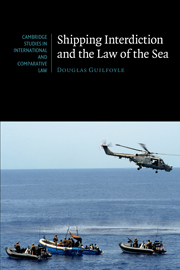Book contents
- Frontmatter
- Contents
- Foreword
- Preface
- Acknowledgements
- List of abbreviations
- Table of treaties and other international agreements
- Table of cases
- PART I General principles
- PART II Interdiction and maritime policing
- 3 General introduction to Part II
- 4 Piracy and the slave trade
- 5 Drug trafficking
- 6 Fisheries management
- 7 Unauthorised broadcasting on the high seas
- 8 Transnational crime: migrant smuggling and human trafficking
- 9 Maritime counter-proliferation of weapons of mass destruction
- PART III The general law of interdiction
- Select bibliography
- Index
- CAMBRIDGE STUDIES IN INTERNATIONAL AND COMPARATIVE LAW
6 - Fisheries management
Published online by Cambridge University Press: 11 September 2009
- Frontmatter
- Contents
- Foreword
- Preface
- Acknowledgements
- List of abbreviations
- Table of treaties and other international agreements
- Table of cases
- PART I General principles
- PART II Interdiction and maritime policing
- 3 General introduction to Part II
- 4 Piracy and the slave trade
- 5 Drug trafficking
- 6 Fisheries management
- 7 Unauthorised broadcasting on the high seas
- 8 Transnational crime: migrant smuggling and human trafficking
- 9 Maritime counter-proliferation of weapons of mass destruction
- PART III The general law of interdiction
- Select bibliography
- Index
- CAMBRIDGE STUDIES IN INTERNATIONAL AND COMPARATIVE LAW
Summary
Introduction
The freedom to fish, a fundamental historical freedom of the high seas, was first justified on the basis that fish were an inexhaustible resource. Before the introduction of industrial fishing technology this may have been a reasonable assumption. But open access to high-seas fisheries as a global commons has led to over-exploitation. Attempts to manage diminishing fish stocks in international law have taken two forms. First, coastal state authority to regulate fisheries has been extended seaward. While this increases regulatory control over some stocks, it has two limitations: high-seas fisheries remain unregulated and it creates ‘straddling’ or ‘highly migratory’ stocks. Second, states have established a variety of regional fisheries management organisations (RFMOs) to co-operate in managing the high-seas fishery for certain stocks in a defined area (management area) by prescribing management and conservation measures (measures). RFMOs form the principal subject of this chapter. High-seas fisheries management arrangements not involving at-sea boarding and inspection are not discussed.
An RFMO's effectiveness may be undermined by fishing not in accordance with its adopted measures, so-called ‘illegal, unreported or unregulated’ fishing (IUU fishing). Illegal fishing is fishing conducted by vessels of any nationality within waters under national jurisdiction in contravention of national laws and regulations; or fishing by vessels which contravenes RFMO measures binding upon the vessel's flag state. Unreported fishing describes catch subject to reporting requirements which goes un- or under-reported to a coastal state authority or RFMO. Unregulated fishing is fishing by stateless or non-party vessels in an RFMO management area in a manner contrary to RFMO measures.
- Type
- Chapter
- Information
- Shipping Interdiction and the Law of the Sea , pp. 97 - 169Publisher: Cambridge University PressPrint publication year: 2009



